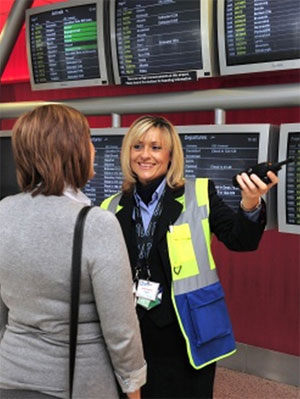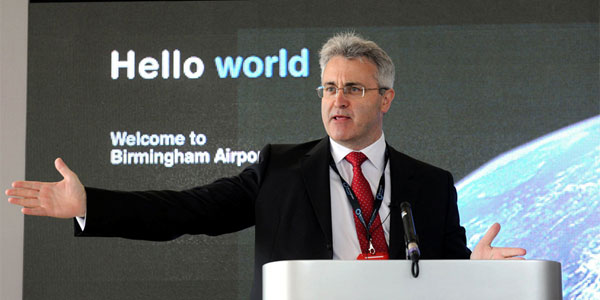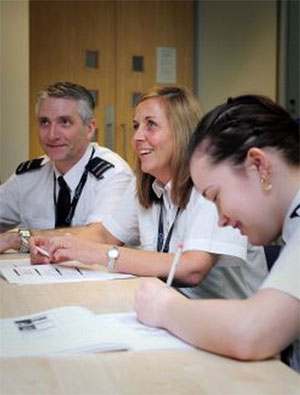
New technology and an increased appreciation of the value of the passenger experience have led to major changes in the way airports and airlines interact with and treat their customers. While we have seen a number of innovative projects implemented in recent times aimed at simplifying and improving the airport experience – including the likes of Qantas’ Next Generation Check-in programme and Iberia’s project Ágora – such initiatives require significant internal upheaval. So, how can airports and airlines manage change to ensure every member of staff buys into the new company values and that the passenger experience does not suffer?
“One of the key things is how do you make sure those involved feel like change is something they can choose?” said Philip Cox-Hynd, Co-founder of Harley Young, Change Management Specialists, who will chair a session on change management at FTE Europe 2014.
Having worked with the likes of Microsoft, Pfizer and Barclays to help manage internal change during major projects, he certainly has the experience to know how to approach this subject, which can often be a major cause for concern for airlines and airports.
Cox-Hynd outlined his five golden rules of change – Vision, Power, Engagement, Involvement and Measurement – which he says are vital to ensuring a company and its customers do not suffer during a major transition. “An organisation won’t bring about change unless there’s leadership,” he said. “If there’s more than one leader, their views must be very, very closely aligned.
“Everyone must also understand what the purpose of change is. A lot of people who have power don’t have the vision, and a lot of people who have the vision often don’t have the power. Getting those two things hand-in-hand is very important.”
Birmingham Airport’s ‘Great People’ initiative

Birmingham Airport Chief Executive, Paul Kehoe, can certainly relate to this having helped to oversee the ‘Great People’ initiative, which saw the airport undertake a major rebrand and redefine its brand values.

“We looked at ourselves and thought: ‘What do we want to be known as?’” he explained. This led him and his staff to identify customer service as a key focal point. “We never compromise on safety, but whenever we do make a compromise it’s always on customer service,” he continued. “But the priority should be on the three S’s – safety, security and service.”
This thinking formed the basis of a wide-reaching customer service programme, which became known as ‘Great People’ and is all about managing interactions with the passenger and ensuring they have everything they need from the moment they leave home, to the moment they leave the airport.
Staff-led change
With 6,000 members of staff on the airport site, Birmingham Airport set out to create a high level of consistency across every single member of staff – something easier said than done considering only 10% of the workforce is directly employed by the airport company.
“We put together a staff committee – not a management committee – to go out to the market and they ran a process to find the right person to help us achieve this,” Kehoe said. “Three companies were involved. One was a corporate plc-type company, one was an educational company, and one was a one-woman band, Alison Delaney from a company called Little Bird. They all presented and the majority went for Alison, and the staff have proved to be right.”
Every member of Birmingham Airport’s staff was then put through a programme that included training on things such as how to deal with and empathise with passengers depending on the experience they are going through. This was then extended to each of the service partners, who put forward ambassadors to be trained.

This inclusive approach – ensuring all members of staff are involved in a change-related project – is vital to promoting its success, according to Cox-Hynd. “People hate being measured against something they didn’t sign up for in the first place,” he stated. “There is a big difference between this type of change and change that is enforced. It’s all about the way people are engaged and listened to. If people haven’t bought into it, change will be very hard to enforce.”
Overcoming change-related challenges
Birmingham Airport may well have taken an effective approach, but that’s not to say Kehoe and his team didn’t face a few challenges along the way. He said: “With any change management programme you’re going to have 20% who are really up for it and think it’s a brilliant idea, 60% who are sort of interested but generally indifferent, and 20% who think ‘it’s not for me’.”
To address this, the way members of staff apply themselves to the ‘Great People’ initiative was made part of their annual appraisal, ensuring the two-way conversation could continue, and reinforcing the fact that everyone has an important role to play.
Battling for custom in a competitive environment
While change management is broadly an internal issue, it can have a huge impact on how satisfied passengers are with their airport experience, and given the high level of competition among airports within the UK and Europe, Kehoe explained that the successful implementation and management of the project was vital to the airport’s wider ambitions.
“In the past, consumers have been prepared to compromise,” he explained. “However, that’s changing and you even see the likes of Ryanair changing their mentality and making service a priority. People flying with a low-cost airline may previously have been a backpacker, but they are now just as likely to be a middle management professional. Also, in the UK, you have around 20 airports competing with one another for passengers, so we have two motives: the first is to get those passengers to choose Birmingham Airport, and the second is once we have them, to make sure we have a content consumer.”
Thanks to the dedication to managing change in the right manner and gaining the trust and support of its staff, Birmingham Airport is moving in the right direction to achieve these goals.
Philip Cox-Hynd, Co-Founder, Harley Young, Change Management Specialists, will chair a session entitled: ‘How do you successfully write the business case and then implement change management – both internally and as an industry – for the benefit of the passenger?’ Among the panellists in the session will be George Zervoudis, Manager, Terminal Services, Athens International Airport.







